Arb sartans - Study guides, Class notes & Summaries
Looking for the best study guides, study notes and summaries about Arb sartans? On this page you'll find 16 study documents about Arb sartans.
Page 2 out of 16 results
Sort by
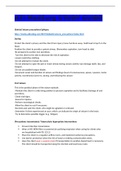
-
ATI MedSurg STUDY GUIDE
- Exam (elaborations) • 59 pages • 2022
-
- $9.99
- + learn more
ATI MedSurg STUDY GUIDE (Safety) Seizure precautions Epilepsy During Protect the client’s privacy and the client from injury (move furniture away, hold head in lap if on the floor). Position the client to provide a patent airway. (Remember aspiration, turn head to side) Be prepared to suction oral secretions. Turn the client to the side to decrease the risk of aspiration. Loosen restrictive clothing. Do not attempt to restrain the client. Do not attempt to open the jaw or insert air...
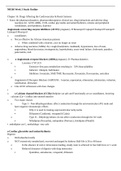
-
NR566 Week 3 and 4 Study Outline Completed docx.
- Other • 17 pages • 2021
-
- $10.99
- + learn more
NR566 Week 3 Study Outline Chapter 16: Drugs Affecting the Cardiovascular & Renal Systems • Know the pharmacodynamics, pharmacotherapeutics clinical use, drug interactions and adverse drug react ions for: ACEI, ARBs, CCB, cardiac glycosides and antiarrhythmics, nitrates and peripheral vasodilators, anti-lipedmics, diuretics Angiotensin converting enzyme inhibitors (ACEI): pregnancy D Benazopril Captopril Enalapril Fosinopril Lisinopril Moexipril o vasodilators o Not as effective for African-Am...
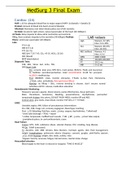
-
MedSurg 3 Final Exam Review
- Exam (elaborations) • 20 pages • 2022
-
- $11.99
- + learn more
Cardiac (24) MAP: > 65 for adequate blood flow to major organs (MAP= 2x diastolic + Systolic/3) Preload: Amount of blood into heart at end of diastole Afterload: Resistance met when blood pushes out of left ventricle SA Node: located in right atrium, natural pacemaker of the heart (60-100bpm) AV Node: delay impulse to allow atrial contraction and ventricle filling, then conducts impulse to the ventricles (40-60bpm) Purkinje Fibers: ventricular pacemaker (20-40bpm) Labs: PT (9-12) INR ...
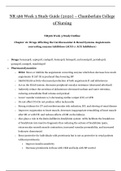
-
NR 566 Week 3 Study Guide {2020} / NR566 Module 3 Study Guide {2020}– Chamberlain College of Nursing
- Summary • 70 pages • 2021
-
- $14.19
- + learn more
NR 566 Week 3 Study Guide {2020} – Chamberlain College of Nursing NR566 Week 3 Study Outline Chapter 16: Drugs Affecting the Cardiovascular & Renal Systems Angiotensin converting enzyme inhibitors (ACEI or ACE Inhibitors) o Drugs: benazepril, captopril, enalapril, fosinopril, lisinopril, and moexipril, perindopril, quinapril, ramipril, trandolapril o Pharmacodynamics: o MOA: Slows or inhibits the angiotensin converting enzyme which then decrease how much angiotensin II (AT II) is prod...
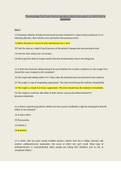
-
Pharmacology Final Exam Review Questions (Open book quizzes & NCLEX Review Questions)
- Exam (elaborations) • 42 pages • 2021
-
- $12.49
- + learn more
Pharmacology Final Exam Review Questions (Open book quizzes & NCLEX Review Questions) Quiz 6 1.) Potassium chloride 10 mEq intravenously has been ordered for a client whose potassium is 2.9 following diuretics. How will the nurse administer the potassium dose? A) Dilute the dose in a 50 ml IV rider and infused over 1 hour B) Push the dose as a rapid IV push because of the patient’s dangerously low potassium level C) Push the dose slowly over 10 minutes D) Ask to give the ...
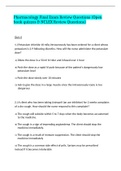
-
Pharmacology Final Exam Review Questions (Open book quizzes & NCLEX Review Questions),100% CORRECT
- Exam (elaborations) • 83 pages • 2021
-
- $18.49
- + learn more
Pharmacology Final Exam Review Questions (Open book quizzes & NCLEX Review Questions) Quiz 6 1.) Potassium chloride 10 mEq intravenously has been ordered for a client whose potassium is 2.9 following diuretics. How will the nurse administer the potassium dose? A) Dilute the dose in a 50 ml IV rider and infused over 1 hour B) Push the dose as a rapid IV push because of the patient’s dangerously low potassium level C) Push the dose slowly over 10 minutes D) Ask to give the ...

$6.50 for your textbook summary multiplied by 100 fellow students... Do the math: that's a lot of money! Don't be a thief of your own wallet and start uploading yours now. Discover all about earning on Stuvia


